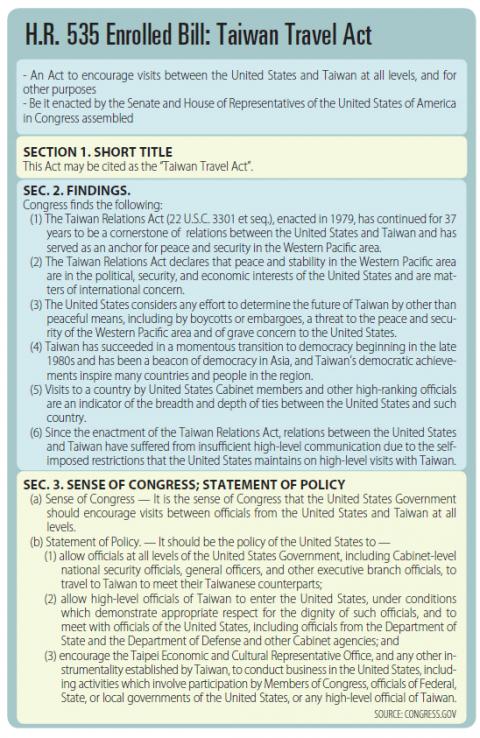US President Donald Trump and President Tsai Ing-wen (蔡英文), as well as Cabinet-level officials from Taiwan and the US, should meet each other to discuss issues of mutual interest, former US deputy secretary of state Richard Armitage said in a paper published by US think tank Project 2049 on Friday.
In a paper titled US-Taiwan Relations in a Sea of Change: Navigating Toward a Brighter Future, coauthored with Ian Easton and Mark Stokes, Armitage made policy recommendations for US-Taiwan relations, one of which is that Trump and Tsai should have a face-to-face meeting.
Such a meeting should address issues of shared interest and concern, the paper said, adding that it would shatter practice since 1979, when the two nations severed official diplomatic ties.

It would also have far greater implications for the US, Taiwan and China than the telephone call between Tsai and Trump on Dec. 2, 2016, when Trump was still president-elect, the paper said.
The recommendation is in line with the Taiwan Travel Act, which was signed into law by Trump on Friday and encourages bilateral visits between government officials at all levels.
Other policy recommendations all addressed how the US could be more active in its relationship with Taiwan.
“The Trump administration should convene an interagency policy working group to evaluate how best to achieve a normal, stable and constructive relationship with Taiwan over the long term,” the paper said.
The US government should also begin negotiating a free trade agreement with Taiwan that is “equal or better than the ones it already has with South Korea, Singapore and Australia,” it added.
The Trump administration should routinize the process of addressing Taiwan’s requests for arms sales and commercial export licenses to assist Taiwan’s indigenous submarine program, and provide timely responses, the paper said.
The US government should base arms sales decisions “solely on considerations of Taiwan’s strategic and operation requirements, which are inherently defensive in nature,” it said.
“Beijing should not be consulted in advance of arms sales to Taiwan,” the paper said, adding that “meeting commitments to regional stability should be considered a more important priority” than US-China diplomatic exchanges.
The paper also said that the Trump administration should “develop and implement a joint workplan for bilateral defense and security relations.”
“Deepened and broadened defense interactions with Taiwan could include training and exercises, modest ports of call in support of humanitarian assistance and disaster relief missions, and regular exchanges of military officers with joint command experience,” it added.
The US Department of State should launch a new initiative to increase the number of exchanges with Taiwan, especially ones pertaining to education and culture, the paper said.
The paper also recommended establishing a “US national committee on US-Taiwan relations” to encourage understanding between Americans and Taiwanese.
Finally, the Trump administration should develop and implement US-Taiwan bilateral working groups on supply chain security and defense industry cooperation “to ensure that the cutting-edge technologies of tomorrow are harnessed for advancing shared values and interests,” the paper said.
Additional reporting by CNA

An essay competition jointly organized by a local writing society and a publisher affiliated with the Chinese Communist Party (CCP) might have contravened the Act Governing Relations Between the People of the Taiwan Area and the Mainland Area (臺灣地區與大陸地區人民關係條例), the Mainland Affairs Council (MAC) said on Thursday. “In this case, the partner organization is clearly an agency under the CCP’s Fujian Provincial Committee,” MAC Deputy Minister and spokesperson Liang Wen-chieh (梁文傑) said at a news briefing in Taipei. “It also involves bringing Taiwanese students to China with all-expenses-paid arrangements to attend award ceremonies and camps,” Liang said. Those two “characteristics” are typically sufficient

A magnitude 5.9 earthquake that struck about 33km off the coast of Hualien City was the "main shock" in a series of quakes in the area, with aftershocks expected over the next three days, the Central Weather Administration (CWA) said yesterday. Prior to the magnitude 5.9 quake shaking most of Taiwan at 6:53pm yesterday, six other earthquakes stronger than a magnitude of 4, starting with a magnitude 5.5 quake at 6:09pm, occurred in the area. CWA Seismological Center Director Wu Chien-fu (吳健富) confirmed that the quakes were all part of the same series and that the magnitude 5.5 temblor was

The brilliant blue waters, thick foliage and bucolic atmosphere on this seemingly idyllic archipelago deep in the Pacific Ocean belie the key role it now plays in a titanic geopolitical struggle. Palau is again on the front line as China, and the US and its allies prepare their forces in an intensifying contest for control over the Asia-Pacific region. The democratic nation of just 17,000 people hosts US-controlled airstrips and soon-to-be-completed radar installations that the US military describes as “critical” to monitoring vast swathes of water and airspace. It is also a key piece of the second island chain, a string of

The Central Weather Administration has issued a heat alert for southeastern Taiwan, warning of temperatures as high as 36°C today, while alerting some coastal areas of strong winds later in the day. Kaohsiung’s Neimen District (內門) and Pingtung County’s Neipu Township (內埔) are under an orange heat alert, which warns of temperatures as high as 36°C for three consecutive days, the CWA said, citing southwest winds. The heat would also extend to Tainan’s Nansi (楠西) and Yujing (玉井) districts, as well as Pingtung’s Gaoshu (高樹), Yanpu (鹽埔) and Majia (瑪家) townships, it said, forecasting highs of up to 36°C in those areas